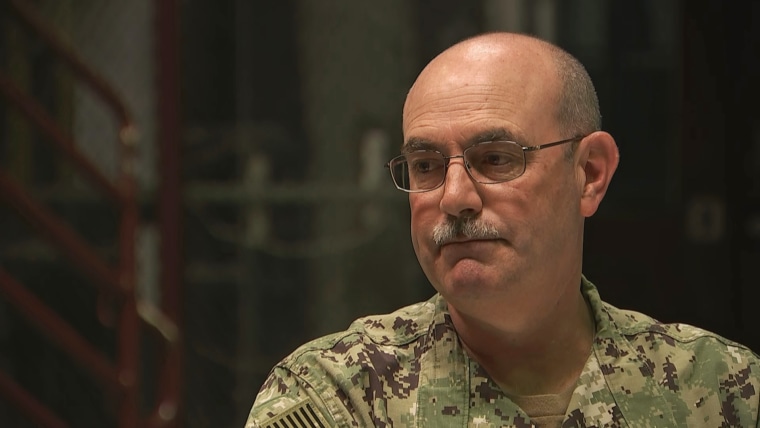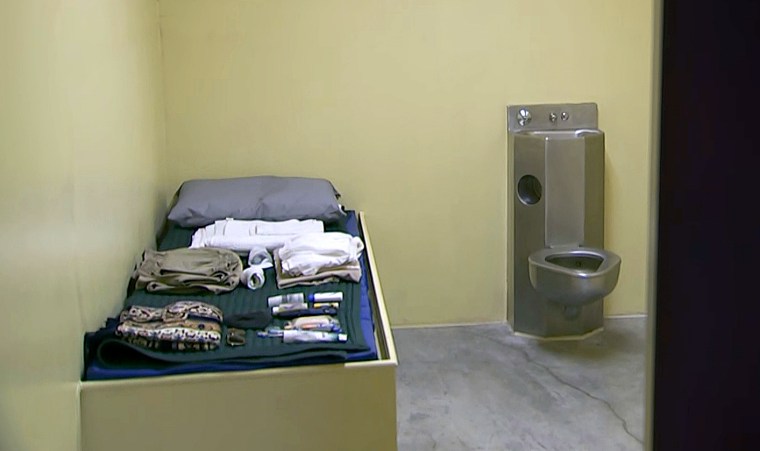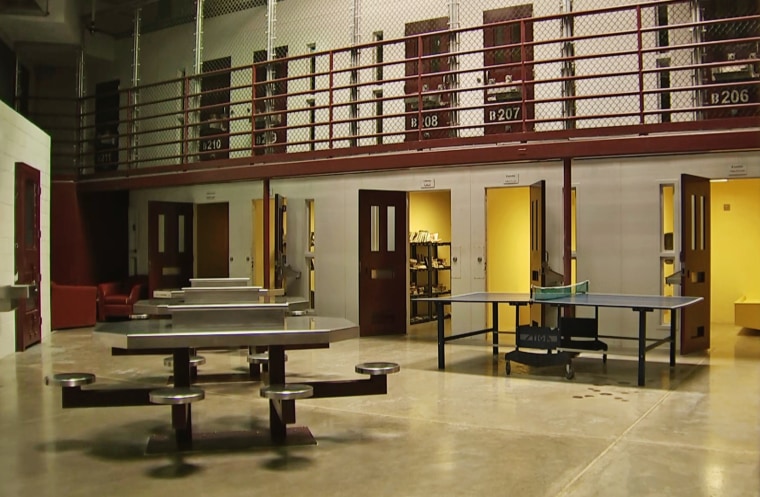GUANTÁNAMO BAY, Cuba — The newest commander of the U.S. mission in Guantanamo Bay has orders from the Pentagon to stay open for another 25 years and to prepare for new detainees, but he lacks the funding from Congress to pay for it.
In an exclusive interview with NBC News inside one of the detention camps, Rear Admiral John Ring said he waits for word from Washington about whether he will need to expand and if he will have the money to pay it.
"I'm the innkeeper," says Ring. "I don't make laws. People in D.C. tell me when people are going away, when people may be coming in, and my job is to keep these folks comfortable, safe."
But without $69 million from Congress, even current operations are in jeopardy. One camp is quickly falling into disrepair and the others are not equipped for a population that is now entering its 70s.
Walking through the corridors of Camp 6, Ring pointed out doors not wide enough to fit wheelchairs and described areas in other camps where the floor is so tilted that guards have had to chisel cement to close the doors.
Ring, who arrived here in April, is the commander in charge of the 16-years-and-running mission known as Joint Task Force Guantanamo.
The Obama administration's stated goal was to close Guantanamo Bay Prison, or Gitmo. Under President Donald Trump, the detention camp for alleged terrorists is now an "enduring mission," and the Pentagon has asked officials here to plan to stay open another 25 years.

There are 40 detainees left at Gitmo. Detainees who arrived as young men are growing old. Their average age is 46, and one is now 71.
The controversial interrogation techniques that were once synonymous with Gitmo would provide no battlefield intelligence today, Ring said, because the last detainee was transferred here in 2008.
Instead he worries about what it would take to build something resembling a nursing home at Guantanamo, and the classified Camp 7 that is falling into disrepair.
"It's sort of falling into the ground and deteriorating rapidly," he said. The septic system in Camp 7 backs up multiple times a month, he said, forcing guards to wear waders into the leach field to clear the system manually.
Upgrades in care
As for the aging population, Ring says it's a matter of when, not if, he will need wheelchair-accessible facilities.
One detainee, Abd Al Hadi, a 56-year-old Iraqi accused of commanding al Qaeda in Afghanistan, recently underwent emergency spine surgery. His recovery postponed his court hearing from September to early 2019 and he has been wheelchair-bound in the process.
Hadi's attorneys say he needed the surgery months before he got it, a claim Ring brushes off as a legal defense strategy.
Ret. Brig. Gen. Stephen Xenakis, a psychiatrist who has done work with detainees in Gitmo, said the delays in care for Hadi and others stem from the necessity of having to fly in specialists, the lack of trust that sometimes exists between the detainee patients and doctors, and medical facilities that need to be updated to detect problems, particularly in an aging population.

Xenakis said medical providers want to provide the same level of care to detainees suspected of terrorism as they would any other patient.
“It’s not for us as doctors and nurses or other professionals to judge. It’s for us to do the best we can and to care for the people who come to us and trust us,” Xenakis said.
Expanding population?
Funding needs for Gitmo are likely to grow if guards are asked to take in more detainees. So far, the Trump administration has left open this possibility but has made no decision over who to transfer there or when to do it.
Ring says with his current staffing, he could accommodate 40 more detainees. With more funding and staff, he could take in 160. But he worries about an unfunded mandate if the Trump administration decides to drastically increase the population without Congress approving the funding.
For now, as the innkeeper, he's planning for the detainees on site. A horticulture program just restarted that allows "compliant" detainees the opportunity to plant cotton, herbs and tomatoes as a reward for good behavior. Ring says that seeing a process through to the end helps keep them mentally stable.
"It has a beginning, middle and end. That's helpful for them," Ring said.
Though for the mission of detaining terror suspects at Guantanamo, the end is not yet in sight.

